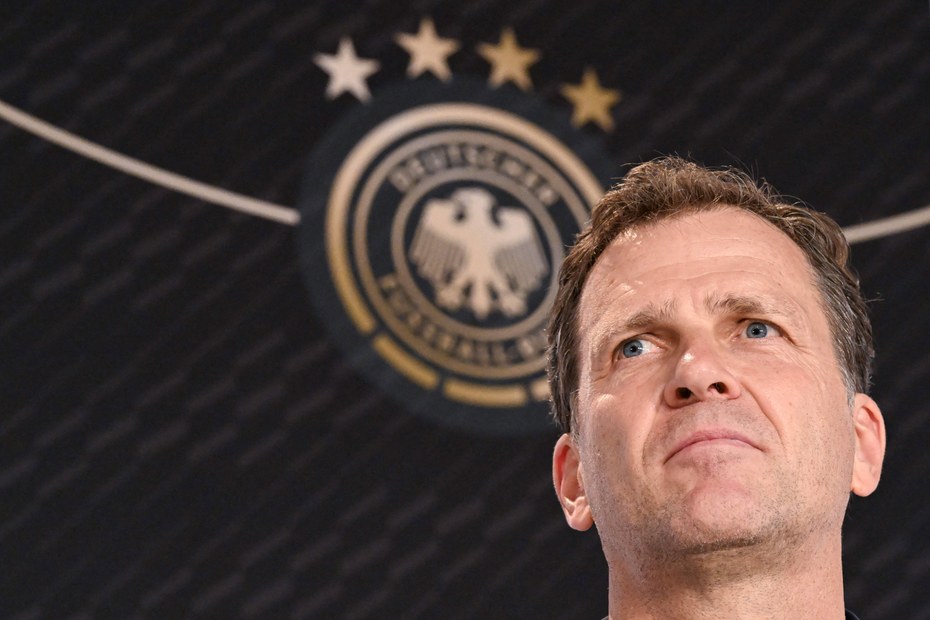portrait Oliver Bierhoff encouraged footballers to read, had Nelson Mandela’s cell built in the team quarters and turned the national team into an influencer. Now, after the World Cup, German football loses its general culprit
Exclusively for subscribers
Oliver Bierhoff terminated his contract with the DFB after the World Cup in Qatar
Photo: Ina Fassbender/AFP/Getty Images
Oliver Bierhoff was unlucky: he always lacked the zeitgeist. He started when he was a player, centre-forward, good in the air in the mid-90s. Football belonged to the noisy men. Lothar Matthäus, from his mouth Bild– Newspaper texts fell, Stefan Effenberg, who intimidated competitors and colleagues, Mario Basler, who presented himself as a bar footballer, Jürgen Klinsmann, who got into a fight with Lothar Matthäus and broke an advertising bin. Oliver Bierhoff was different: he couldn’t find a place in the Bundesliga, he played in Austria and Italy, he studied and had cultured manners. When reporters visited him in Milan for an interview, he discreetly paid the bar bill. When he became a national player, many couldn’t do anything with i
and good manners. When reporters visited him in Milan for an interview, he discreetly paid the bar bill. When he became a national team player, many people couldn’t relate to him, he didn’t seem to fit in this rough society. He was a headball player, but he wasn’t recognized for it like Horst Hrubesch (“Manni flank, I head, goal”). When he then also scored the “golden goal” at the 1996 European Championships, got advertising contracts and the others did not, became the profit center of the association as a manager, and many Bierhoffs were given advertising contracts – but despite all the successes he fell during the his stint with the German Football Association, that’s not right either. Fans want their sport back in an environment they consider more original, more authentic. Oliver Bierhoff represents everything they reject. He is the marketing mainstream that is no longer wanted. What lasted a long time ended in a cold and de facto termination of the contract, which began with Jürgen Klinsmann: Was football in Germany thankless? Or did Oliver Bierhoff play the role of him? Perhaps he did many things right at the beginning and more wrong recently: he arrived in DFB two years after the end of his playing career. It was 2004, he became team manager. The post existed before, but Bernd Pfaff, who occupied it, was a soldier in the association who booked hotels and flights. Bierhoff could do much more. He started under new national coach and reformer Jürgen Klinsmann. The team manager relieved the stress-prone coach and became the spokesman for the national team when Sonnyboy Klinsi hid out at his California home for weeks. Bierhoff was innovative, he kept the players busy with fireside chats, to which he invited extreme athletes, or with watchmaking courses. He encouraged reading and sometimes practiced, doubling the centre-forward, who was strong in the air, when the imminent opponent had such a guy. He also developed a sense of when an action might be too much. Then he revived his idea – like that at the 2010 World Cup in South Africa, to have freedom fighter Nelson Mandela’s prison cell faithfully rebuilt in the team hotel to make the players humble many in the DFB humility: l national coach Joachim Löw, who thought he was invincible and reduced the number of shots in his job; even the press department radiated the complacency of champion life. Bierhoff celebrated for his choice of headquarters in Brazil (Camp Bahia, where the players united in a band of friends), from that moment on he turned the big wheel, he no longer saw himself as just a coach, but as a authority that established the main line of German football. He had once commissioned a report from a private university to find out what the national team meant to the people of the country. He called it “the fourth force”. The team has become an influencer, it should not only stand out for its performance, but also for its social values. The national team became “The Team”. Bierhoff presented new advertising partnerships. It was where the alienation kicked in for many fans. International matches became unbearable when the “National Team Fan Club powered by Coca Cola” initiated by Bierhoff began its soulless choreography supervised by PR agencies. Bierhoff also had opponents when things were going well. Rudi Völler, under whom he had still played, mocked him long after his active career because of his “Malta feet” (Völler meant: not a good footballer), from Munich’s Karl-Heinz Rummenigge from Bayern complained of him as ” I-AG from lake Starnberg”. But no one could stop Bierhoff from expanding his power: from team manager to general manager of national teams and academia. The scientific orientation of the DFB, the construction of an elite center, as the French had long had, became his life project. But Bierhoff has long been met with too much distrust for college football to be accepted without reservations. When he announced that the possibilities of artificial intelligence were also being worked on there, he was only shocked: What else is Bierhoff doing to good old football? he is up and running has been taken. The fact that the “Bierhoff out” request is met initially will leave a void, especially for those who have made it more and more urgent in recent years. German football loses its guilty general.


